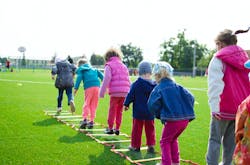NIH launches research study on the novel coronavirus in children
The National Institutes of Health (NIH) has launched a study to determine the rate of SARS-CoV-2 infection in children.
The study, called Human Epidemiology and Response to SARS-CoV-2 (HEROS), also will help determine what percentage of children infected with SARS-CoV-2, the virus that causes COVID-19, develop symptoms of the disease, the NIH said in a press release.
In addition, the HEROS study will examine whether rates of SARS-CoV-2 infection differ between children who have asthma or other allergic conditions and children who do not. The National Institute of Allergy and Infectious Diseases (NIAID), part of the NIH, is sponsoring and funding the HEROS study.
"One interesting feature of this novel coronavirus pandemic is that very few children have become sick with COVID-19 compared to adults," said NIAID Director Anthony S. Fauci, MD. "Is this because children are resistant to infection with SARS-CoV-2, or because they are infected but do not develop symptoms? The HEROS study will help us begin to answer these and other key questions."
The study team will enroll 6,000 people from 2,000 U.S. families already participating in NIH-funded pediatric research studies in 11 cities. The study team will prospectively follow these children and their families for six months to determine who gets infected with SARS-CoV-2, whether the virus is transmitted to other family members, and which family members with the virus develop COVID-19.
Preliminary evidence suggests that having an allergic condition paradoxically may reduce a person's susceptibility to SARS-CoV-2 infection and severe COVID-19 disease. A NIAID-funded study recently examined upper and lower airway cells for the expression of ACE2, the gene that codes for the receptor that the coronavirus uses to infect cells. In both children and adults, respiratory allergy, asthma and controlled allergen exposure were associated with significantly reduced ACE2 expression. The expression of ACE2 was lowest in people with high levels of both asthma and sensitivity to allergens.
The HEROS study will further clarify whether reduced ACE2 gene expression in airway cells of children with allergic diseases correlates with a lower rate of SARS-CoV-2 infection and COVID-19.

